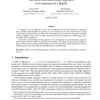Free Online Productivity Tools
i2Speak
i2Symbol
i2OCR
iTex2Img
iWeb2Print
iWeb2Shot
i2Type
iPdf2Split
iPdf2Merge
i2Bopomofo
i2Arabic
i2Style
i2Image
i2PDF
iLatex2Rtf
Sci2ools
111
click to vote
EUROCRYPT
2008
Springer
2008
Springer
Sub-linear Zero-Knowledge Argument for Correctness of a Shuffle
A shuffle of a set of ciphertexts is a new set of ciphertexts with the same plaintexts in permuted order. Shuffles of homomorphic encryptions are a key component in mix-nets, which in turn are used in protocols for anonymization and voting. Since the plaintexts are encrypted it is not directly verifiable whether a shuffle is correct, and it is often necessary to prove the correctness of a shuffle using a zeroknowledge proof or argument. In previous zero-knowledge shuffle arguments from the literature the communication complexity grows linearly with the number of ciphertexts in the shuffle. We suggest the first practical shuffle argument with sub-linear communication complexity. Our result stems from combining previous work on shuffle arguments with ideas taken from probabilistically checkable proofs.
| Added | 19 Oct 2010 |
| Updated | 19 Oct 2010 |
| Type | Conference |
| Year | 2008 |
| Where | EUROCRYPT |
| Authors | Jens Groth, Yuval Ishai |
Comments (0)

